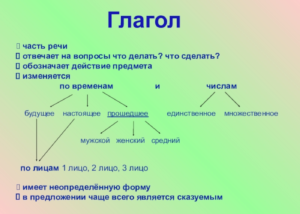
The Russian language is considered complex not only its alphabet because, the words order in a sentence, but also its verbs because, which treatment differs markedly from that adopted in other European languages. However, this system has its own understandable logic, and serious exceptions are rare. Let us tell you about the Russian verbs basic features.
Verbs in Russian have two kinds (perfect and imperfect), two conjugations (types I and II) and, as in many other languages, three tenses: present, past and future.
A Russian verb initial form is called the infinitive. Verbs are presented in the dictionary in the form. A verb infinitive form has no person, no number and is not determined in time. It can act as a sentence any part. The personal verb forms act as a predicate. The infinitive usually answers the question “Что делать? / What to do?“ или “Что сделать? / What to do?“:
The infinitive grammatical property is reciprocation. It may be non-returnable (радовать / joy, учить / learn), when the action is directed to someone else, and it may be retractable (радоваться / rejoice, учиться / learn), when the action is directed to oneself, then the suffix –ся appears.
Verbs in Russian change in person and number and agree with the action subject. This is especially true of verbs in the present tense:
Past tense verbs agree with the subject according to their gender (Feminine, Masculine and Neuter):
The biggest difficulty in learning Russian verbs is conjugation. There are two conjugations: types II and I. Depending on the conjugation type, the verb will change (conjugate) in the sentence, changing in person and number. Most verbs can be clearly distinguished according to the conjugation type, paying attention to the ending.
For example, verbs ending in -ать, -ять and -еть belong to the I conjugation. There are exceptions:
In addition, about the second conjugation – almost all verbs with the ending in -ить belong to it. Again, there are no exceptions:
There are, moreover, verbs, which, when they are conjugated, can have both the I conjugation and the II conjugation. These verbs are, for instance:
Verbs a number may have some letters in their bases or endings changed when they are changed in persons, numbers and tenses. For example:
Verb conjugation is a difficult topic, and even native speakers are sometimes confused about how to correctly conjugate a particular verb. Therefore, it is important to take things slowly; it is better to learn five verbs but properly than ten but superficially. And it’s better to remember right away how each verb changes.
By clicking "Send" you agree to us processing your information
Verbs a peculiarity in the Russian language is the species category presence. There are only two kinds: perfect and imperfect. The first type verbs answer the question “What shall I do?” and indicate the completion of an action or result. The imperfect verbs answer the question “What to do?” and indicate the action, habitual or repetitive action process or incompleteness.
Imperfect verbs can be used in any tense form, while perfect verbs can only be used in the past and future.

Зимой я чищу снег каждое утро. Вчера я чистил снег. Завтра я тоже буду чистить снег. — In the winter, I shovel snow every morning. Yesterday I shoveled snow. Tomorrow I’ll be shoveling snow, too.
Чистить — что делать? denotes the process.
Вчера я почистил снег. Завтра я снова почищу снег. — Yesterday I shoveled the snow. Tomorrow I will shovel the snow again.
Почистить — что сделать? shows the action completeness.
And now for the nice part: there are only verbs three tenses in Russian, unlike in English or French, for example. The different aspects (duration or completeness) help to show just the kinds and conjugations.
The present tense is used to describe situations that are happening right now and are not over yet. Unlike English, in Russian there is only the present tense one form. In order to form the present tense personal form correctly, you need to know the conjugation.
Я читаю каждый выходной. — I read every weekend.
Сейчас мама готовит пирог. — Now my mom is making a pie.
The past tense is used to describe actions that took place in the past. Although there is the past tense only one form in Russian, it is not that simple. Russian verbs in the past tense have aspect (kind) a grammatical category, which expresses how the action denoted by the verb extends through time.
Вчера я рисовал все утро. — Yesterday I was painting the whole morning.
The action duration is shown (it is more important than finality) and an imperfect verb is used.
Вчера я прочитал интересную книгу. — Yesterday I read an interesting book.
It’s the result that counts, so choose a perfect verb.
The future tense is used, respectively, to convey actions that will happen sometime in the future. As there are verbs different kinds in Russian, there are the future tense two forms: the simple and the compound.
Я буду играть с детьми завтра утром. — I’ll be playing with the kids tomorrow morning.
A compound form is used (verb to be in the personal form + sense verb in the infinitive form), with the verb imperfect, the process is important.
К пяти вечера я уже приготовлю пирог. — I’ll have the pie ready by 5 p.m.
The simple form is used (it changes according to its conjugation type in the same way as a similar verb without a prefix in the present tense), the result is important.
At first glance, you may think this topic is too difficult. Nevertheless, complexity is meant to be overcome. In addition, the more and more regularly you practice, the faster and easier you will get through the task.
We hope you found this article useful. We are ready to help you learn Russian online with a native speaker. Classes are individually adapted to your wishes. Submit an application for a free trial lesson and we will find the most suitable Russian language course for you.

By clicking "Send", you consent to us processing of your information.





By clicking "Send" you agree to us processing your information
By clicking "Send" you agree to us processing your information